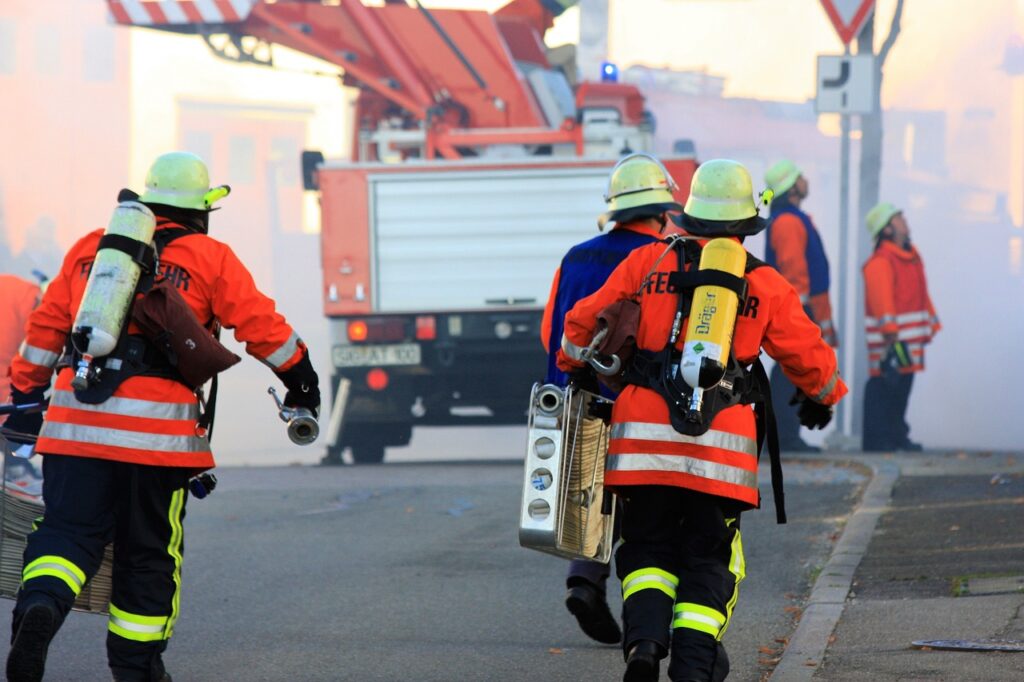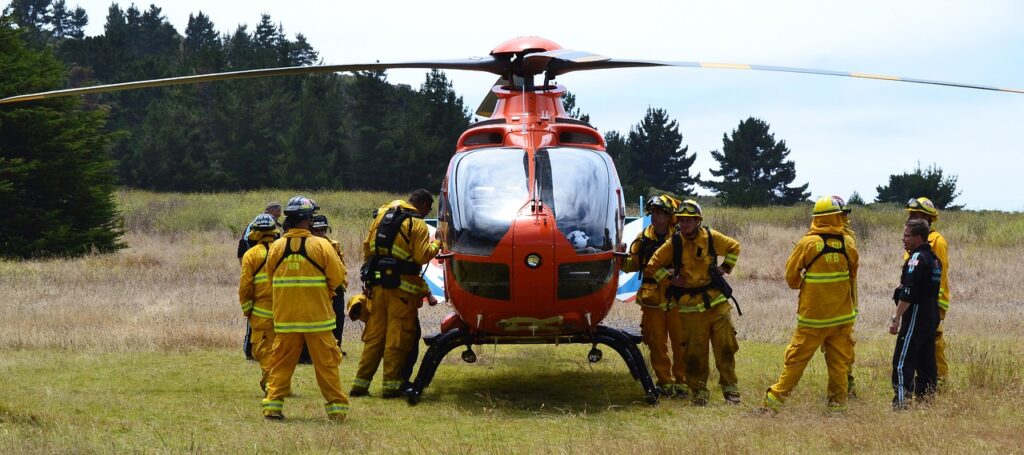Key takeaways
- An emergency management degree equips you with the skills needed to deal with natural disasters.
- The program features a blended curriculum with courses from IT, cybersecurity, social sciences, public administration, and more.
- Specializations in emergency management degree include public administration, homeland security, occupational health and safety, fire science, and disaster relief.
- Renowned colleges offering a bachelor’s emergency management degree include Rivier University, University of Central Florida, Miramar College, and others.
- For an emergency management bachelor’s degree online explore American Military University, University of Akron, Voorhees College, and more.
- Job opportunities you can explore with a formal education include Emergency Services Manager, Emergency Management Director, and Sustainability Manager, among others.
- Top industry employees are the Federal Emergency Management Agency, Department of Homeland Security, Center for Disease Control and Prevention, and other organizations and agencies.
- Natural disasters, accidents, and sudden calamities are an unpredictable and unavoidable part of life. With an emergency management degree, you can be prepared to prevent or tackle any kind of emergency that arises.
In this guide, you will learn what an emergency management degree is, including program details, admission requirements, and colleges offering a bachelor’s degree. We also discuss career opportunities you can explore with a bachelor’s degree, industry trends, and career outlook.
What is emergency management?

Emergency management is the process of predicting, responding to, and recovering from emergencies. These include natural disasters, pandemics, terrorist attacks, technological issues, and any other situation that leaves daily life upended. There are four stages of emergency management.
- Mitigation
- Preparedness
- Response
- Recovery
Mitigation
Mitigation is the process of eliminating or reducing risks to communities, infrastructure, and individuals through careful planning, strategizing, and long-term efforts. These efforts are continuous and ongoing at federal, state, local, and to an extent even individual levels. Disaster mitigation strategies are vast and varied, from training to insurance programs, and building and zoning codes, to constructing tornado-safe rooms.
Preparedness
Whether disasters are natural or man-made, it pays to be prepared. The most important part of being prepared for any kind of natural disaster is knowing what to do and having a plan you and your family follow in an emergency. Some steps you can take include having an emergency reserve fund, an emergency supply kit, an emergency contact number, an action plan, and being aware of nearby health facilities, warning systems, shelter locations, and more.
Response
The initial response to a disastrous situation has a significant impact on the overall effectiveness of the disaster management plan. Efficient response can help save lives, reduce impact, restore essential services, provide physical and emotional support to individuals, prevent disease spread, provide temporary shelter, and more.
Recovery
This phase involves the restoration of services and life back to normal or finding a new normal. It includes restoration of physical infrastructure such as roads, electricity, water, and gas as well as IT infrastructure. The recovery phase also includes the provision of healthcare services and support to the affected and this support can come in many forms from therapy sessions and physiotherapy sessions to financial aid, and more.
What does an emergency management degree entail?
An emergency management degree is a multidisciplinary program featuring a blend of physical science, technology, engineering, social science, healthcare, and human geography courses. The program features a practical curriculum focusing on training individuals to deal with various emergencies as efficiently as possible.
Through the program, you will develop a range of competencies enabling you to detect a crisis situation, carefully assess and analyze the extent of damage, respond to the situation, and work towards recovery. Here, you will not only learn to strategize an emergency management plan but also take field trips to learn field-based disaster management.
The program features a blended curriculum providing detailed information and comprehensive knowledge of management, project management, public administration, and more. You can pursue an emergency management degree at the associate, bachelor, master, or doctoral level.
Associate degree in emergency management
At the associate level, you can pursue an Associate of Applied Science in:
- Emergency Management
- Emergency Management and Homeland Security
- Emergency Management Technology
- Hazardous Materials Management
- Fire Protection Technology
Associate programs are an excellent starting point for aspiring emergency management professionals. The program lasts two years providing students with a strong foundation in the field. After graduating with an emergency management degree, students can either pursue entry-level jobs or pursue a bachelor’s degree.
Bachelor’s degree in emergency management
A bachelor’s degree in emergency management features a more comprehensive curriculum than an associate program. The program lasts four years and is the highest level of education at the undergraduate level. Through the program, you will benefit from hands-on learning opportunities, and real-world applications through site visits, simulated learning, and fieldwork.
The blended curriculum allows students to develop a comprehensive understanding of best practices, strategies, and techniques in emergency management. Additionally, students learn problem-solving, critical thinking, analytical skills, and more through hands-on learning experiences.
Master’s degree in emergency management
A master’s degree can help you advance your career options. It is ideal for those who want to advance their careers in emergency management and take on upper managerial responsibilities. The program lasts 1 to 3 years and features a blend of theoretical classes and hands-on learning experiences. Additionally, students are provided opportunities to demonstrate professional expertise through internships and projects.
Doctorate in emergency management
A doctorate opens more advanced career opportunities in teaching and research within the field of emergency management. PhD graduates have a deeper understanding of the policy-making process within the field. They learn to analyze data, analyze evidence, and make informed decisions when drafting new policies and creating emergency management strategies.
A PhD lasts 3 to 5 years if completed on time and pursued full-time. It can be extended up to 8 years, depending on how long it takes a student to complete their research.
Bachelor’s emergency management degree – program details

College education is a significant time and financial commitment. Thus, choosing the right program must always take precedence. When it comes to formal education in any field, a bachelor’s degree offers higher value than an associate program. It not only opens a wider range of career opportunities but also has a broader learning scope, equipping students with comprehensive field knowledge and skill set.
At the bachelor level, you will come across a Bachelor of Arts (BA), or a Bachelor of Science (BS) in emergency management. A BA program features liberal arts and humanities courses in the general education component, whereas a BS program is more technical with science and mathematics courses.
Another difference between the two programs is that a BS program focuses on building technical and analytical skills specific to your field of study. However, a BA program has a broader scope of learning and builds transferable skills such as critical thinking, communication, collaboration, and more.
Besides these subtle differences, the core curriculum of an emergency degree is essentially the same.
Typical program curriculum
A bachelor’s degree features 120 to 135 credit hours. The exact number of credit hours a student must undertake varies by college or university. Typically, students need to take the required amount of credit hours in general education, core-specific, and elective courses. If you are pursuing a specialization, you will also need to undertake the required amount of credit hours to complete your concentration.
General, electives, and concentration-specific courses vary by college, program type, faculty expertise, and more. Here are some core-specific courses that you may come across in a bachelor’s degree in emergency management.
- Introduction to Emergency Management
- Hazard Identification and Risk Assessment
- Natural Disaster Management
- Emergency Decision Making
- Emergency Management Plan Development
- Social Media Application for Emergency and Disaster Management
- Foundations of Psychology for Health and Human Services
- Developing a Disaster Recovery Plan
- Consequence Management
- Psychology of Stress and Trauma
- Water Policy and Management
- Risk Communications
- Humanitarian Relief
- Climate Change Impact, Mitigation, and Adaptation
- Research Design and Methods
- Post-Impact Disaster Management
Additionally, you will need to take courses in civil, political, and social sciences to better understand the socio-political cultural dynamics of the environment where emergency management specialists are operating. Additionally, students are given a broad range of electives to choose from and may also take up concentration areas to develop niche-specific skills and knowledge.
Available specializations
There are several specializations within an emergency management degree that you can pursue. However, not all colleges and universities offer the complete range of available concentrations. When choosing colleges, we suggest you check which specializations the college offers. Here are some specializations in an emergency management degree.
Homeland Security
The homeland security specialization covers a broad range of topics, including terrorism, risk mitigation and management, tactical emergency response, cybersecurity, border protection, intelligence analysis, and more. It is an interdisciplinary specialization featuring courses in IT, public administration, cybersecurity, public relations, and more.
Disaster Relief
Through the specialization, students learn how to respond to and recover from disasters. They undertake courses in search and rescue, emergency medical care, shelter management, logistics supply chain management, community assessment and needs analysis, infrastructure repair and reconstruction, project management, and more.
Fire Science
Fire science specialization equips students with the knowledge and skills needed to deal with wild and industrial fires. The specialization features courses such as fire prevention strategies, disaster preparedness planning, legal and political framework of emergency response, crisis management recovery approaches, and more.
Public Administration
The public administration specialization equips students with the knowledge needed for public policy analysis, financial reporting, budgeting, environmental policy and management, human resources management, public financial management, and more. It features a diverse curriculum building a range of competencies needed for risk assessment, crisis management, crisis communication, resource mobilization, and so on.
Child Protection
Emergencies and disastrous situations put children at greater risk of neglect, abuse, exploitation, and displacement. The child protection specialization features a blend of courses in child development and psychology, child abuse and neglect, child protection law and policy, child advocacy and intervention, behavioral health science, research methods in childcare, and trauma-informed care.
Occupational Health and Safety
Courses in occupational health and safety specialization include Introduction to Occupational Health and Safety, Fire Protection, Construction Safety, Hazard Identification and Risk Assessment, Advanced Safety and Health, Risk Management, Emergency Management, Program Management, and so on. Through the specialization, students develop an in-depth understanding of the importance of health and safety during emergency management efforts.
Admission requirements
The admission requirements for an emergency management bachelor’s degree vary by college and program. They are also dependent on whether you are a local, national, or international student. Generally, the admission requirements for high school graduates applying to a bachelor’s degree for the first time include:
- High school transcript – minimum GPA requirements vary by college and program
- Recommendation letters – at least 2
- College essay – requirements vary by college
- Standardized test scores (ACT/SAT – especially for out-of-state students)
- Language testing scores (IELTS/TOEFL – for international students)
Students applying for a bachelor’s degree after graduating with an associate degree have to fulfill different requirements. They too must submit recommendation letters and a college essay. However, instead of high school transcripts, they submit their official associate degree transcripts.
Additionally, they must also determine how many of their prior credits earned are transferable to their bachelor’s to determine how many more they need to fulfill the graduation requirements.
Graduation requirements
Graduation requirements are what students must fulfill to earn their degree. At the bachelor’s level, these generally include fulfillment of required credit hours. For a bachelor’s degree, these range from 120 to 135 and sometimes even more. Additionally, students must complete an internship, or fieldwork requirements in an emergency management degree to provide proof of learning.
In some colleges, students enrolled in an emergency management degree need to complete a capstone project in a simulated disaster scenario to demonstrate proof of learning. Successful completion of the capstone project earns students a significant number of credits and students must also have completed a set number of credits before becoming eligible to undertake the capstone project.
Colleges offering a bachelor’s degree in emergency management
Several colleges across the US offer an emergency management degree at all levels. Here is a list of some offering a bachelor’s degree in the field that aspiring emergency management professionals can explore.
| College | Acceptance % | Graduation % | Tuition |
| University of New Haven | 91% | 62% | $47,332 |
| Rowan University | 77% | 78% | $15,700 in-state
$25,564 out-of-state |
| Rivier University | 84% | 45% | $37,791 |
| University of Central Florida | 41% | 76% | $6,368 in-state
$22,467 out-of-state |
| University at Albany | 68% | 63% | $10,408 in-state
$28,998 out-of-state |
| Metropolitan College of New York School for Public Affairs and Administration | 65% | 54% | $20,188 |
| Miramar College – San Diego | 100% | 17.5% | $1,150 in-state
$9,094 out-of-state |
Can I pursue an emergency management degree online?

Many renowned colleges and universities across the US are offering an online emergency management degree. Students who prefer the distance learning format or are hoping to pursue employment alongside their education can explore colleges from the list below.
Colleges offering an emergency management bachelor’s degree online
The following list contains colleges and universities offering an online emergency management degree.
| College | Acceptance % | Graduation % | Tuition |
| American Military University | 45% | 55% | $6,000 |
| University of Akron Online | 71% | 50% | $13,315 in-state
$20,815 out-of-state |
| Anderson University South Carolina | 45% | 65% | $33,580 |
| Voorhees College | 50% | 36% | $12,630 |
Advantages of pursuing an online emergency management degree
An online learning program offers significant advantages to learners. These include the flexibility and convenience of being able to attend classes from the comfort of your home. Online students don’t have to arrange for transport or consider the time it takes to get to the campus to attend classes.
Moreover, the lack of transportation and accommodation costs significantly reduces the overall cost of attendance of a program, making an online degree a much more affordable option. The lack of geographical barriers and restrictions makes an online degree a much more accessible option for students.
Whether you are enrolled in a synchronous or asynchronous program, students enjoy great flexibility. Those in an asynchronous program don’t even have to stick to a campus class schedule enabling them to take on full-time employment in an organization.
Disadvantages of pursuing an emergency management degree online
While there are significant advantages to pursuing an online program, there are also some major downsides. The lack of technical support is one of them. Students must ensure they have an active working internet connection, the latest software, and other IT requirements to successfully complete their education.
Moreover, in an online emergency management degree, distance learning can be a major disadvantage. Students won’t have access to group simulated learning activities or be able to undertake fieldwork.
Some other disadvantages include technical issues, lack of connectivity, lack of structure and discipline, and more. Students will be responsible for their own learning journey, placing a lot more burden on them. If one is not self-reliant, an online program may not be ideal for them.
Emergency management degree jobs you can get with a bachelor
A bachelor’s degree in emergency management opens a wide range of career opportunities for graduates. The multidisciplinary program builds a wide range of professional skills and competencies enabling graduates to pursue managerial, policy-making, research, and other roles in private and public for-profit and non-profit organizations as well as government organizations. Here are some job roles graduates with a degree in emergency management can explore.
| Job title | Average salary |
| Emergency Management Director | $83,960 |
| Budget Analysts | $84,940 |
| Management Analysts | $99,410 |
| Project Management Specialists | $98,580 |
| Sustainability Consultant | $80,401 |
| Emergency Services Manager | $84,680 |
| Environmental Manager | $77,524 |
| Operations Analyst | $67,877 |
Emergency management degree jobs career outlook and hiring trends
Emergency and disaster management specialists are in demand. If COVID-19 has highlighted anything, it is that we must always be prepared for any kind of situation. Thus, the demand for emergency management professionals has risen significantly. The job outlook for roles such as an Emergency Management Director is 4% for 2023 – 2033 according to the United Bureau of Labor Statistics.
The job growth rate is the same as the national average for all occupations indicating a steady predicted increase in the demand for qualified professionals and a certain extent of job security in the next decade and maybe even more. With a bachelor’s degree in emergency management, you become eligible for most open positions in the field, including top-tier positions such as Emergency Management Director.
Top employers of emergency management professionals
Top emergency management employers include:
- Federal Agencies
- State and local Government Agencies
- Non-Governmental Organizations (NGOs)
- Private Sector – typically hired graduates with an occupational health and safety or a public administration specialization.
- Academic Institutions
Industry collaboration and networking opportunities
To become an industry professional, networking is key. There are several organizations offering opportunities for industry collaboration and networking opportunities. Here are a few you can explore:
- Professional Associations such as the Internal Association for Emergency Managers (IAEM) and National Emergency Management Association (NEMA).
- Interagency meetings
- Conferences and workshops
The emergency management field is a highly collaborative professional field that requires collaboration. Professionals come together to discuss policies, strategies, and procedures and even brainstorm ways to improve the emergency management field. Additionally, government organizations, communities, and non-profit organizations also offer opportunities for professional discourse and collaborative efforts toward societal, and environmental betterment.
Frequently Asked Questions (FAQs) about emergency management degree

Here are the answers to some frequently asked questions about the emergency management program.
What can you do with an emergency management degree?
With an emergency management degree, you can work for federal agencies, state and local government organizations, non-profit organizations, private companies, and so on.
What is an emergency management degree?
An emergency management bachelor’s degree is a 4-year program that equips you with the knowledge and skills needed to respond to and recover from disastrous situations. These include natural disasters, terrorist attacks, IT failures, and more. Additionally, you will be able to draft policies and conduct research to improve emergency management strategies and practices.
Is a degree in emergency management worth it?
An emergency management degree opens vast career opportunities in a variety of fields. From private organizations to NGOs to federal, state, and local government organizations, and more. Qualified professionals are highly in demand in the emergency management field and job opportunities in the industry are to grow by 4% from 2023-2033 as per BLS. The job outlook has grown from 3% predicted for 2021-2031.
Additionally, emergency management professionals enjoy great pay and lead an exciting career dealing with unexpected situations. If you enjoy hands-on problem-solving and are passionate about helping people and aiding recovery and rehabilitation, an emergency management degree is worth it.
Is emergency management a good degree?
The program features a multidisciplinary curriculum building a diverse range of skills and knowledge. With the knowledge and skills gained in the program, graduates can pursue a variety of job opportunities not just in emergency management, but also in the corporate sector in roles such as Operations Analyst, Budget Analyst, or go into public policy making.
What jobs can you get with an emergency management degree?
The job opportunities you can explore with a bachelor’s degree in emergency management are vast and varied. With a formal education and relevant work experience, you even become eligible for top-tier managerial positions such as Emergency Services Manager, Emergency Management Director, Environmental Manager, Sustainability Manager, and so on.
Additionally, you can also explore corporate jobs such as Budget Analyst, Operations Analyst, Management Analyst, Project Management Specialist, and so on.
Explore rewarding careers with an emergency management degree – Apply today!
An emergency management degree leads to many exciting career opportunities. If you too want to become a part of the in-demand field, enroll in an emergency management degree today. There are several colleges across the US that offer a bachelor’s degree in the field. You can either search for colleges and programs by name or explore all options from the list above.
All Bachelor Degrees offer a college search tool that can make the college hunt a lot easier. You can also benefit from the AI Essay Generator the platform offers. With the help of these tools, college planning and application becomes easier.
